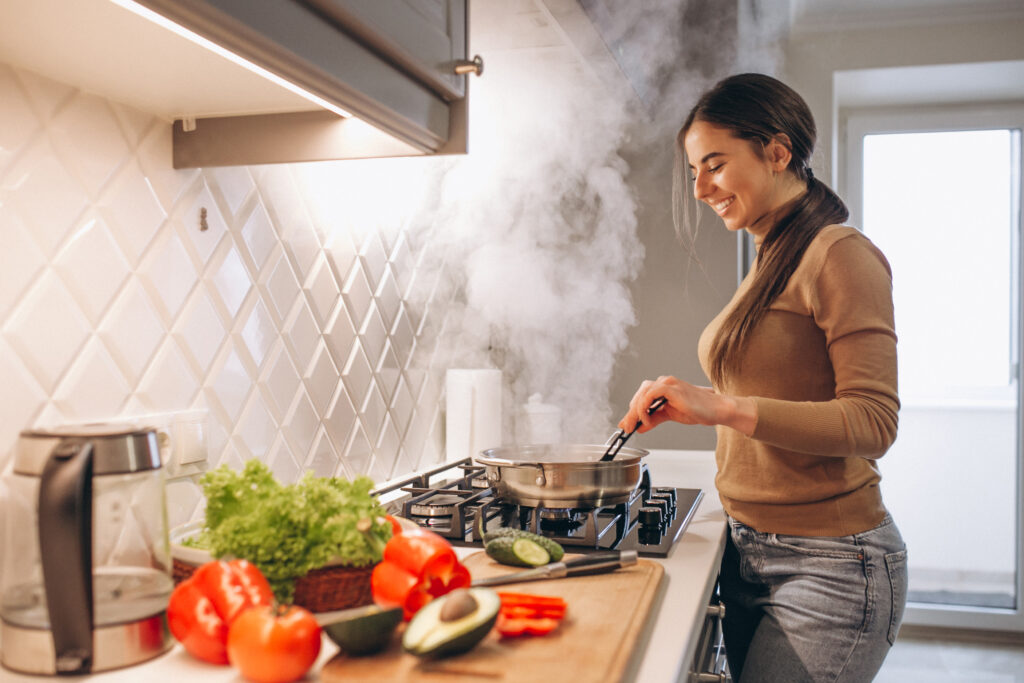The kitchen is often the heart of the home, a place where delicious meals are prepared, and memories are made. However, it’s also a space that can pose various hazards if proper safety measures are not followed. By prioritizing kitchen safety, you can create a secure environment for yourself and your loved ones. In this blog, we’ll explore important practices and guidelines to help prevent accidents and injuries in the kitchen.

Keep Your Kitchen Clean and Clutter-Free:
A clean and organized kitchen is a safer kitchen. Regularly clean spills and messes to prevent slips and falls. Keep countertops clear of unnecessary items, and ensure that all appliances, utensils, and equipment are stored properly when not in use. This reduces the risk of accidents caused by tripping or falling objects.
Practise Safe Handling of Knives and Sharp Objects:
Knives are essential tools in the kitchen but can also be dangerous if mishandled. Always use a cutting board to chop or slice ingredients, and hold the knife with a firm grip. Store knives in a designated knife block or drawer, keeping them out of reach of children. Remember to wash knives separately and dry them thoroughly to prevent accidents caused by slippery handles.
Use Caution When Working with Heat and Flames:
The stove and oven are potential sources of burns and fires. Never leave the kitchen unattended when cooking, especially when using high heat or open flames. Use pot holders or oven mitts to handle hot pots, pans, and baking trays. Keep flammable objects, such as paper towels and oven mitts, away from heat sources. Install a fire extinguisher in the kitchen and familiarize yourself with its proper use.
Practice Electrical Safety:
Electrical appliances are common in the kitchen, so it’s crucial to follow electrical safety guidelines. Avoid using damaged or frayed cords and keep them away from water and heat sources. Unplug appliances when not in use and never overload electrical outlets. Regularly inspect and maintain your kitchen’s electrical system to prevent electrical hazards.
Properly Store and Handle Chemicals:
Cleaning products and chemicals are often kept in the kitchen. Ensure that these items are stored in a secure place, out of reach of children and pets. Keep them away from food preparation areas to prevent cross-contamination. When using chemicals, such as oven cleaners or drain openers, follow the manufacturer’s instructions, wear protective gloves, and work in a well-ventilated area.
Prevent Slips and Falls:
Slips and falls are common kitchen accidents. Install slip-resistant flooring or use rugs with non-slip backing. Immediately clean up spills and drips to prevent slippery surfaces. Use step stools or ladders to reach high cabinets rather than standing on chairs or countertops, which can be unstable.
Practice Food Safety:
Maintaining proper food safety practices is essential to prevent foodborne illnesses. Wash your hands thoroughly before handling food, and clean all kitchen surfaces, utensils, and cutting boards after each use. Store raw meats separately from other foods to avoid cross-contamination. Cook food at the appropriate temperatures to kill bacteria, and refrigerate perishable items promptly.
Educate and Supervise Children:
If you have children, teach them about kitchen safety from an early age. Explain the potential dangers and establish rules for safe behaviour in the kitchen. Keep sharp objects, hot surfaces, and hazardous substances out of their reach. Supervise their activities closely to prevent accidents.
Conclusion:
Kitchen safety is paramount for preventing accidents and injuries in the heart of your home. By implementing these important practices and guidelines, you can create a safe and secure environment for cooking and enjoying meals. Remember to stay vigilant, educate your family members about kitchen safety, and always prioritize caution and awareness when working in the kitchen.
